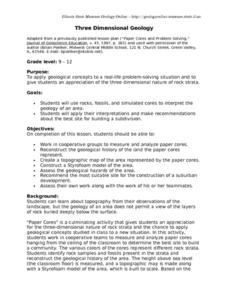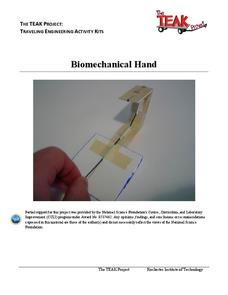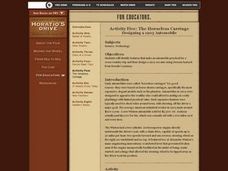American Chemical Society
Energy Levels, Electrons, and Ionic Boding
Learners see how electrons are transferred in the bonding of NaCl. They then create models of NaCl using styrofoam balls and toothpicks to assist them in explaining the formation of ions and ionic bonding.
American Chemical Society
pH and Color Change
Did you know strong bases can feel slippery and slimy? Lesson allows scholars to practice using the pH scale to identify acids and bases and their strengths. By changing the concentration of an acid and a base, they create the entire...
Howard Hughes Medical Institute
Modeling Food Webs in Darién, Panama
It's a jungle out there! Young biologists journey to Darien, Panama to examine the intricate relationships between the organisms that inhabit the jungle. Groups begin by demonstrating an understanding of energy flow in ecosystems, then...
Science Matters
Formative Assessment #4: Body Chart
The body is one big life-sized puzzle! A hands-on lesson builds on the idea and has individuals create life-size models of the body including all important organs of the digestive, circulatory, and respiratory systems. After building...
NASA
The Cycle of Matter
An educational lesson focuses on the idea of conservation of matter through a demonstration of the water cycle, a discussion of digesting food, and the path of carbon and oxygen atoms as they change form.
Virginia Department of Education
The Hydrologic Cycle
There is the same amount of water on earth now as there was when it was formed. The water from your faucet could contain molecules that dinosaurs drank! Young scientists build their own hydrologic cycle model and observe...
Virginia Department of Education
Metamorphic Rocks
Rocks can bend? Pupils investigate how heat and pressure produce metamorphic rocks by modeling them using clay, and then categorize samples based on observable characteristics. The lesson ends with a metamorphic rock identification...
Curated OER
Cycles and Starting Mealworms
Here is a fascinating lesson about the life cycles of plants and animals, and other cycles found in nature. Learners explore the cycle of the moon, the tides, and other sequences of events in every day life. The big activity is the...
Curated OER
Three Dimensional Geology
Here is a fine lesson plan on geology designed for high schoolers. Learners use rocks, fossils, and other geological clues to determine the geology of an area. Then, they make recommendations to a fictitious city council about the...
Curated OER
Galaxy Adventure
Working in groups, learners create a mnemonic device, give an oral presentation, and create a pictorial representation of the correct sequence of the planets and asteroid belt from the sun. An assessment rubric is included in the lesson.
Rochester Institute of Technology
Biomechanical Hand
In 1993, five biomedical engineers in Edinburgh, Scotland, created the first functional bionic arm. In the activity, learners explore the world of bioengineering through discussion and hands-on exploration. In groups, participants...
Towson University
The Wildlife Forensics Lab
Can science put an end to the poaching of endangered species? Show your young forensic experts how biotechnology can help save wildlife through an exciting electrophoresis lab. Grouped pupils analyze shark DNA to determine if it came...
Chicago Botanic Garden
Climate Change Around the World
It is unknown if cloud cover increases in response to carbon dioxide levels changing, helping climate change slow down, or if cloud cover decreases, allowing Earth to warm faster. Part four in the series of five lessons has classes...
Chicago Botanic Garden
Causes and Effects of Climate Change
Wrap-up a unit on global climate change with a lesson that examines the causes and effects of climate change. Learners fill out a chart that represents what they think causes climate change—natural and human-based—and what they think...
Chicago Botanic Garden
Review and Assessment: Causes and Effects of Climate Changes
The last activity in the series of five is a short one where individuals show what they've learned about the causes and effects of climate change. Working independently, they fill in a graphic organizer, then compare their notes with a...
Curated OER
Build an Approximate Scale Model of an Object
Young scholars create a model of an object of their choice using sketches that they have drawn. They study what a scale model is and how to construct one. They examine the uses for scale models and why they are produced.
Curated OER
Discovering Saturn, The Real "Lord of the Rings"
Reading, writing, and rings! A lesson from NASA combines space science with authentic reading and writing tasks. Included in this lesson are pre-reading activities, four mini informational booklets on Saturn, a structured...
Curated OER
Modeling the Big Bang and the Formation of the Universe
Sixth graders conduct an experiment to understand the Big Bang Theory. In this Big Bang Theory lesson, 6th graders will observe a balloon with confetti popping to emulate and analyze information related tot he Big Bang theory....
Curated OER
New Zealand Subduction Zone Model
Students explore world geography by creating a model in class. In this tectonic plate lesson, students identify diagrams which discuss the tectonic plates in New Zealand and how they affect everyday life. Students utilize cardboard,...
Curated OER
How Can We Make a Model of Lungs?
Fifth graders examine the function of the lungs and create a model of the lungs. Using a plastic cup, drinking straw, plastic bag, small balloon, and a rubber band, they follow step-by-step directions to construct simulated lungs. ...
Curated OER
Staying Young with Vitamin E
Investigate how Vitamin E is used to prevent cell aging. Young scientists coat the surface of apples and bananas with oil, Vitamin E, and water. They place each in a petri dish and cover them to observe oxidation over time. They answer 8...
Curated OER
Activity Five: The Horseless Carriage
Students identify features that make an automobile practical for a cross-country trip and then design a 1903 era auto using lessons learned from Horatio's journey.
Curated OER
temperature and the Scientific Method Lesson Plan
Sixth graders study heat, temperature, and heat transfer. Using probeware, the teacher demonstrates boiling points. Students participate in experiments and record the beginning and ending temperatures and mass of objects. After...
Curated OER
Properties of Water with a Splash of Color
Students explore the properties of water. In this cross curriculum art and physical science lesson, students experiment with a variety of materials to demonstrate the cohesive forces and adhesion of water. Students create a water color...























